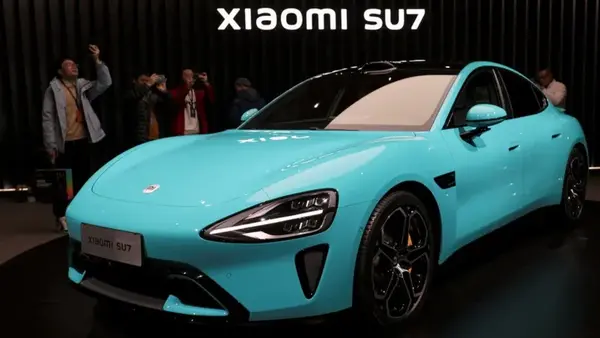Just days after Chinese smartphone maker Xiaomi launched its first electric vehicle (EV), buyers have been told they may have to wait up to six months for their car to be delivered.
Screen grabs on Chinese social media show the firm advising buyers it could take 27 weeks to deliver the SU7 Max.
The company previously said pre-orders had hit 88,898 within 24 hours of it starting to take orders on Thursday.
Xiaomi did not immediately respond to a BBC request for comment.
The technology giant, which is the third-largest seller of smartphones in the world with a market share of about 12%, is taking on EV rivals including Tesla and BYD in the world’s biggest market for cars.
The standard SU7 model is priced at 215,900 yuan ($29,872; £23,663) and the Max version costs 299,900 yuan.
The starting price in China for Tesla’s Model 3 is 245,900 yuan.
The SU7, which has drawn comparisons with Porsche’s Taycan and Panamera models, has a minimum range of 700km (435 miles), beating the Tesla Model 3’s 567km.
As part of its campaign to promote the SU7, Xiaomi also released special versions of the car called the Founder’s Edition, that come with free gifts, such as fridges.
On Sunday, the technology giant’s chief executive Lei Jun said in a Weibo post that it would open a second round of sales for the Founder’s Edition.
The firm is hoping that the SU7’s shared operating system with its phones, laptops and other devices will appeal to existing customers.
Xiaomi’s EVs are made by a unit of state-owned car manufacturer BAIC Group at a plant in Beijing that can produce as many as 200,000 vehicles a year.
But the move comes as sales growth of EVs has slowed globally, triggering a price war.
Tesla, which is headed by multi-billionaire Elon Musk, has cut the cost of its cars in China by thousands of dollars in recent months as local rivals like the world’s top-selling EV maker BYD have slashed prices.
In an indication of the challenges facing technology firms who want to make electric cars, iPhone maker Apple last month reportedly cancelled its plans to build an EV.
Last week, BYD posted record annual profits but said growth had slowed towards the end of last year.
Shanghai-based electric car maker Nio also lowered its forecast for first quarter deliveries as consumers tightened spending as China’s economic growth weakens.
American EV giant Tesla is due to announce its delivery numbers for the first three months of 2024 this week. Shares in Tesla fell by almost 30% in the first quarter.
Xiaomi has said it will invest $10bn (£7.9bn) in its vehicles business over the next 10 years.
Just days after Chinese smartphone maker Xiaomi launched its first electric vehicle (EV), buyers have been told they may have to wait up to six months for their car to be delivered.
Screen grabs on Chinese social media show the firm advising buyers it could take 27 weeks to deliver the SU7 Max.
The company previously said pre-orders had hit 88,898 within 24 hours of it starting to take orders on Thursday.
Xiaomi did not immediately respond to a BBC request for comment.
The technology giant, which is the third-largest seller of smartphones in the world with a market share of about 12%, is taking on EV rivals including Tesla and BYD in the world’s biggest market for cars.
The standard SU7 model is priced at 215,900 yuan ($29,872; £23,663) and the Max version costs 299,900 yuan.
The starting price in China for Tesla’s Model 3 is 245,900 yuan.
The SU7, which has drawn comparisons with Porsche’s Taycan and Panamera models, has a minimum range of 700km (435 miles), beating the Tesla Model 3’s 567km.
As part of its campaign to promote the SU7, Xiaomi also released special versions of the car called the Founder’s Edition, that come with free gifts, such as fridges.
On Sunday, the technology giant’s chief executive Lei Jun said in a Weibo post that it would open a second round of sales for the Founder’s Edition.
The firm is hoping that the SU7’s shared operating system with its phones, laptops and other devices will appeal to existing customers.
Xiaomi’s EVs are made by a unit of state-owned car manufacturer BAIC Group at a plant in Beijing that can produce as many as 200,000 vehicles a year.
But the move comes as sales growth of EVs has slowed globally, triggering a price war.
Tesla, which is headed by multi-billionaire Elon Musk, has cut the cost of its cars in China by thousands of dollars in recent months as local rivals like the world’s top-selling EV maker BYD have slashed prices.
In an indication of the challenges facing technology firms who want to make electric cars, iPhone maker Apple last month reportedly cancelled its plans to build an EV.
Last week, BYD posted record annual profits but said growth had slowed towards the end of last year.
Shanghai-based electric car maker Nio also lowered its forecast for first quarter deliveries as consumers tightened spending as China’s economic growth weakens.
American EV giant Tesla is due to announce its delivery numbers for the first three months of 2024 this week. Shares in Tesla fell by almost 30% in the first quarter.
Xiaomi has said it will invest $10bn (£7.9bn) in its vehicles business over the next 10 years.
Just days after Chinese smartphone maker Xiaomi launched its first electric vehicle (EV), buyers have been told they may have to wait up to six months for their car to be delivered.
Screen grabs on Chinese social media show the firm advising buyers it could take 27 weeks to deliver the SU7 Max.
The company previously said pre-orders had hit 88,898 within 24 hours of it starting to take orders on Thursday.
Xiaomi did not immediately respond to a BBC request for comment.
The technology giant, which is the third-largest seller of smartphones in the world with a market share of about 12%, is taking on EV rivals including Tesla and BYD in the world’s biggest market for cars.
The standard SU7 model is priced at 215,900 yuan ($29,872; £23,663) and the Max version costs 299,900 yuan.
The starting price in China for Tesla’s Model 3 is 245,900 yuan.
The SU7, which has drawn comparisons with Porsche’s Taycan and Panamera models, has a minimum range of 700km (435 miles), beating the Tesla Model 3’s 567km.
As part of its campaign to promote the SU7, Xiaomi also released special versions of the car called the Founder’s Edition, that come with free gifts, such as fridges.
On Sunday, the technology giant’s chief executive Lei Jun said in a Weibo post that it would open a second round of sales for the Founder’s Edition.
The firm is hoping that the SU7’s shared operating system with its phones, laptops and other devices will appeal to existing customers.
Xiaomi’s EVs are made by a unit of state-owned car manufacturer BAIC Group at a plant in Beijing that can produce as many as 200,000 vehicles a year.
But the move comes as sales growth of EVs has slowed globally, triggering a price war.
Tesla, which is headed by multi-billionaire Elon Musk, has cut the cost of its cars in China by thousands of dollars in recent months as local rivals like the world’s top-selling EV maker BYD have slashed prices.
In an indication of the challenges facing technology firms who want to make electric cars, iPhone maker Apple last month reportedly cancelled its plans to build an EV.
Last week, BYD posted record annual profits but said growth had slowed towards the end of last year.
Shanghai-based electric car maker Nio also lowered its forecast for first quarter deliveries as consumers tightened spending as China’s economic growth weakens.
American EV giant Tesla is due to announce its delivery numbers for the first three months of 2024 this week. Shares in Tesla fell by almost 30% in the first quarter.
Xiaomi has said it will invest $10bn (£7.9bn) in its vehicles business over the next 10 years.
Just days after Chinese smartphone maker Xiaomi launched its first electric vehicle (EV), buyers have been told they may have to wait up to six months for their car to be delivered.
Screen grabs on Chinese social media show the firm advising buyers it could take 27 weeks to deliver the SU7 Max.
The company previously said pre-orders had hit 88,898 within 24 hours of it starting to take orders on Thursday.
Xiaomi did not immediately respond to a BBC request for comment.
The technology giant, which is the third-largest seller of smartphones in the world with a market share of about 12%, is taking on EV rivals including Tesla and BYD in the world’s biggest market for cars.
The standard SU7 model is priced at 215,900 yuan ($29,872; £23,663) and the Max version costs 299,900 yuan.
The starting price in China for Tesla’s Model 3 is 245,900 yuan.
The SU7, which has drawn comparisons with Porsche’s Taycan and Panamera models, has a minimum range of 700km (435 miles), beating the Tesla Model 3’s 567km.
As part of its campaign to promote the SU7, Xiaomi also released special versions of the car called the Founder’s Edition, that come with free gifts, such as fridges.
On Sunday, the technology giant’s chief executive Lei Jun said in a Weibo post that it would open a second round of sales for the Founder’s Edition.
The firm is hoping that the SU7’s shared operating system with its phones, laptops and other devices will appeal to existing customers.
Xiaomi’s EVs are made by a unit of state-owned car manufacturer BAIC Group at a plant in Beijing that can produce as many as 200,000 vehicles a year.
But the move comes as sales growth of EVs has slowed globally, triggering a price war.
Tesla, which is headed by multi-billionaire Elon Musk, has cut the cost of its cars in China by thousands of dollars in recent months as local rivals like the world’s top-selling EV maker BYD have slashed prices.
In an indication of the challenges facing technology firms who want to make electric cars, iPhone maker Apple last month reportedly cancelled its plans to build an EV.
Last week, BYD posted record annual profits but said growth had slowed towards the end of last year.
Shanghai-based electric car maker Nio also lowered its forecast for first quarter deliveries as consumers tightened spending as China’s economic growth weakens.
American EV giant Tesla is due to announce its delivery numbers for the first three months of 2024 this week. Shares in Tesla fell by almost 30% in the first quarter.
Xiaomi has said it will invest $10bn (£7.9bn) in its vehicles business over the next 10 years.
Just days after Chinese smartphone maker Xiaomi launched its first electric vehicle (EV), buyers have been told they may have to wait up to six months for their car to be delivered.
Screen grabs on Chinese social media show the firm advising buyers it could take 27 weeks to deliver the SU7 Max.
The company previously said pre-orders had hit 88,898 within 24 hours of it starting to take orders on Thursday.
Xiaomi did not immediately respond to a BBC request for comment.
The technology giant, which is the third-largest seller of smartphones in the world with a market share of about 12%, is taking on EV rivals including Tesla and BYD in the world’s biggest market for cars.
The standard SU7 model is priced at 215,900 yuan ($29,872; £23,663) and the Max version costs 299,900 yuan.
The starting price in China for Tesla’s Model 3 is 245,900 yuan.
The SU7, which has drawn comparisons with Porsche’s Taycan and Panamera models, has a minimum range of 700km (435 miles), beating the Tesla Model 3’s 567km.
As part of its campaign to promote the SU7, Xiaomi also released special versions of the car called the Founder’s Edition, that come with free gifts, such as fridges.
On Sunday, the technology giant’s chief executive Lei Jun said in a Weibo post that it would open a second round of sales for the Founder’s Edition.
The firm is hoping that the SU7’s shared operating system with its phones, laptops and other devices will appeal to existing customers.
Xiaomi’s EVs are made by a unit of state-owned car manufacturer BAIC Group at a plant in Beijing that can produce as many as 200,000 vehicles a year.
But the move comes as sales growth of EVs has slowed globally, triggering a price war.
Tesla, which is headed by multi-billionaire Elon Musk, has cut the cost of its cars in China by thousands of dollars in recent months as local rivals like the world’s top-selling EV maker BYD have slashed prices.
In an indication of the challenges facing technology firms who want to make electric cars, iPhone maker Apple last month reportedly cancelled its plans to build an EV.
Last week, BYD posted record annual profits but said growth had slowed towards the end of last year.
Shanghai-based electric car maker Nio also lowered its forecast for first quarter deliveries as consumers tightened spending as China’s economic growth weakens.
American EV giant Tesla is due to announce its delivery numbers for the first three months of 2024 this week. Shares in Tesla fell by almost 30% in the first quarter.
Xiaomi has said it will invest $10bn (£7.9bn) in its vehicles business over the next 10 years.
Just days after Chinese smartphone maker Xiaomi launched its first electric vehicle (EV), buyers have been told they may have to wait up to six months for their car to be delivered.
Screen grabs on Chinese social media show the firm advising buyers it could take 27 weeks to deliver the SU7 Max.
The company previously said pre-orders had hit 88,898 within 24 hours of it starting to take orders on Thursday.
Xiaomi did not immediately respond to a BBC request for comment.
The technology giant, which is the third-largest seller of smartphones in the world with a market share of about 12%, is taking on EV rivals including Tesla and BYD in the world’s biggest market for cars.
The standard SU7 model is priced at 215,900 yuan ($29,872; £23,663) and the Max version costs 299,900 yuan.
The starting price in China for Tesla’s Model 3 is 245,900 yuan.
The SU7, which has drawn comparisons with Porsche’s Taycan and Panamera models, has a minimum range of 700km (435 miles), beating the Tesla Model 3’s 567km.
As part of its campaign to promote the SU7, Xiaomi also released special versions of the car called the Founder’s Edition, that come with free gifts, such as fridges.
On Sunday, the technology giant’s chief executive Lei Jun said in a Weibo post that it would open a second round of sales for the Founder’s Edition.
The firm is hoping that the SU7’s shared operating system with its phones, laptops and other devices will appeal to existing customers.
Xiaomi’s EVs are made by a unit of state-owned car manufacturer BAIC Group at a plant in Beijing that can produce as many as 200,000 vehicles a year.
But the move comes as sales growth of EVs has slowed globally, triggering a price war.
Tesla, which is headed by multi-billionaire Elon Musk, has cut the cost of its cars in China by thousands of dollars in recent months as local rivals like the world’s top-selling EV maker BYD have slashed prices.
In an indication of the challenges facing technology firms who want to make electric cars, iPhone maker Apple last month reportedly cancelled its plans to build an EV.
Last week, BYD posted record annual profits but said growth had slowed towards the end of last year.
Shanghai-based electric car maker Nio also lowered its forecast for first quarter deliveries as consumers tightened spending as China’s economic growth weakens.
American EV giant Tesla is due to announce its delivery numbers for the first three months of 2024 this week. Shares in Tesla fell by almost 30% in the first quarter.
Xiaomi has said it will invest $10bn (£7.9bn) in its vehicles business over the next 10 years.
Just days after Chinese smartphone maker Xiaomi launched its first electric vehicle (EV), buyers have been told they may have to wait up to six months for their car to be delivered.
Screen grabs on Chinese social media show the firm advising buyers it could take 27 weeks to deliver the SU7 Max.
The company previously said pre-orders had hit 88,898 within 24 hours of it starting to take orders on Thursday.
Xiaomi did not immediately respond to a BBC request for comment.
The technology giant, which is the third-largest seller of smartphones in the world with a market share of about 12%, is taking on EV rivals including Tesla and BYD in the world’s biggest market for cars.
The standard SU7 model is priced at 215,900 yuan ($29,872; £23,663) and the Max version costs 299,900 yuan.
The starting price in China for Tesla’s Model 3 is 245,900 yuan.
The SU7, which has drawn comparisons with Porsche’s Taycan and Panamera models, has a minimum range of 700km (435 miles), beating the Tesla Model 3’s 567km.
As part of its campaign to promote the SU7, Xiaomi also released special versions of the car called the Founder’s Edition, that come with free gifts, such as fridges.
On Sunday, the technology giant’s chief executive Lei Jun said in a Weibo post that it would open a second round of sales for the Founder’s Edition.
The firm is hoping that the SU7’s shared operating system with its phones, laptops and other devices will appeal to existing customers.
Xiaomi’s EVs are made by a unit of state-owned car manufacturer BAIC Group at a plant in Beijing that can produce as many as 200,000 vehicles a year.
But the move comes as sales growth of EVs has slowed globally, triggering a price war.
Tesla, which is headed by multi-billionaire Elon Musk, has cut the cost of its cars in China by thousands of dollars in recent months as local rivals like the world’s top-selling EV maker BYD have slashed prices.
In an indication of the challenges facing technology firms who want to make electric cars, iPhone maker Apple last month reportedly cancelled its plans to build an EV.
Last week, BYD posted record annual profits but said growth had slowed towards the end of last year.
Shanghai-based electric car maker Nio also lowered its forecast for first quarter deliveries as consumers tightened spending as China’s economic growth weakens.
American EV giant Tesla is due to announce its delivery numbers for the first three months of 2024 this week. Shares in Tesla fell by almost 30% in the first quarter.
Xiaomi has said it will invest $10bn (£7.9bn) in its vehicles business over the next 10 years.
Just days after Chinese smartphone maker Xiaomi launched its first electric vehicle (EV), buyers have been told they may have to wait up to six months for their car to be delivered.
Screen grabs on Chinese social media show the firm advising buyers it could take 27 weeks to deliver the SU7 Max.
The company previously said pre-orders had hit 88,898 within 24 hours of it starting to take orders on Thursday.
Xiaomi did not immediately respond to a BBC request for comment.
The technology giant, which is the third-largest seller of smartphones in the world with a market share of about 12%, is taking on EV rivals including Tesla and BYD in the world’s biggest market for cars.
The standard SU7 model is priced at 215,900 yuan ($29,872; £23,663) and the Max version costs 299,900 yuan.
The starting price in China for Tesla’s Model 3 is 245,900 yuan.
The SU7, which has drawn comparisons with Porsche’s Taycan and Panamera models, has a minimum range of 700km (435 miles), beating the Tesla Model 3’s 567km.
As part of its campaign to promote the SU7, Xiaomi also released special versions of the car called the Founder’s Edition, that come with free gifts, such as fridges.
On Sunday, the technology giant’s chief executive Lei Jun said in a Weibo post that it would open a second round of sales for the Founder’s Edition.
The firm is hoping that the SU7’s shared operating system with its phones, laptops and other devices will appeal to existing customers.
Xiaomi’s EVs are made by a unit of state-owned car manufacturer BAIC Group at a plant in Beijing that can produce as many as 200,000 vehicles a year.
But the move comes as sales growth of EVs has slowed globally, triggering a price war.
Tesla, which is headed by multi-billionaire Elon Musk, has cut the cost of its cars in China by thousands of dollars in recent months as local rivals like the world’s top-selling EV maker BYD have slashed prices.
In an indication of the challenges facing technology firms who want to make electric cars, iPhone maker Apple last month reportedly cancelled its plans to build an EV.
Last week, BYD posted record annual profits but said growth had slowed towards the end of last year.
Shanghai-based electric car maker Nio also lowered its forecast for first quarter deliveries as consumers tightened spending as China’s economic growth weakens.
American EV giant Tesla is due to announce its delivery numbers for the first three months of 2024 this week. Shares in Tesla fell by almost 30% in the first quarter.
Xiaomi has said it will invest $10bn (£7.9bn) in its vehicles business over the next 10 years.














